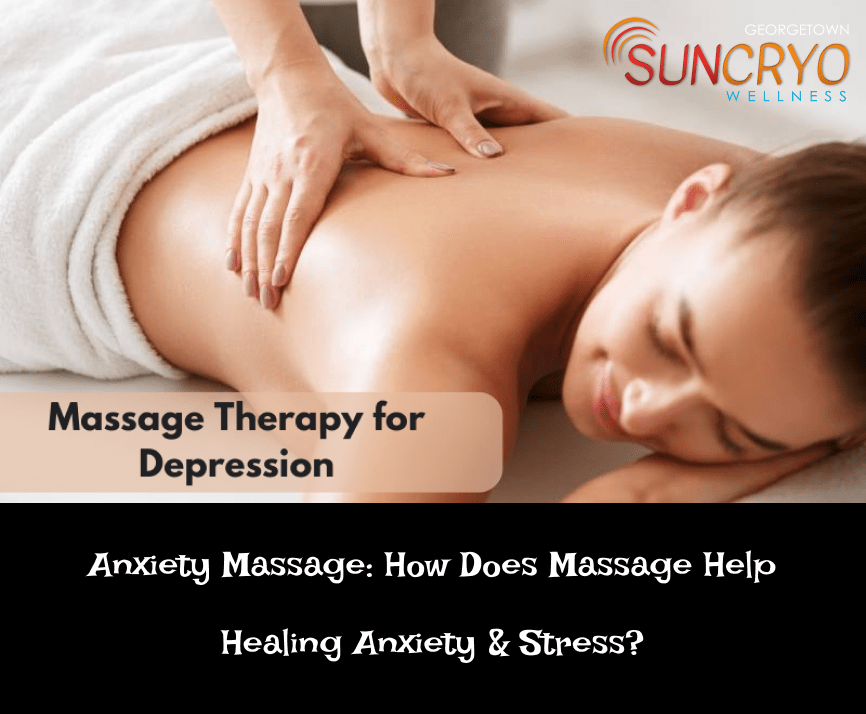Anxiety Massage

Are you aware of the effectiveness of massage in alleviating anxiety? Research has demonstrated that massage therapy can significantly help in reducing anxiety and stress, presenting a readily accessible treatment option. Both these issues can have lasting effects on your physical and mental well-being, making it crucial to address them promptly to prevent long-term harm.
The Anxiety and Depression Association of America (ADAA) reports that over 19% of the adult population in the US experiences some form of anxiety disorder. But does massage genuinely aid anxiety, or do we assume its effectiveness is due to its relaxing effects? In this article, we’ll explore how massage therapy contributes to managing anxiety and stress, specifically focusing on how massage chairs can be beneficial in coping with these conditions.
How Does Massage Assist with Anxiety?
Scientific studies have established a strong connection between massage and the reduction of anxiety. By manipulating muscles and tissues, massage triggers a series of physiological responses that soothe the nervous system and induce profound relaxation.
This process involves the release of endorphins, the body’s natural painkillers and mood elevators. As endorphin levels increase, the body’s stress hormone, cortisol, decreases, promoting an overall sense of well-being.
Numerous individuals who have experienced massages can attest to their relaxing effects. Whether through a therapist’s hands or a massage chair, countless stories underscore the calming nature of a good massage. As scientific evidence and personal experiences converge, it becomes increasingly clear that massage offers a promising avenue for managing anxiety and stress, delivering both physical and emotional relief.
Impact of Massage on Anxiety and Stress
Massages not only aid in relaxation but also play a pivotal role in the interaction between mental and physical aspects of well-being. Serving as a holistic therapy, massage provides diverse benefits for individuals grappling with anxiety and stress:
Physical Effects
Endorphin release
During a massage, the body releases endorphins, natural mood enhancers, and pain relievers, inducing a sense of euphoria and relaxation, countering the stress response.
Cortisol reduction
Massage diminishes the body’s cortisol production, the primary stress hormone, resulting in decreased anxiety and tension.
Muscle relaxation
Massages alleviate tense muscles, easing physical tension, a common manifestation of stress, consequently promoting mental tranquility.
Psychological Effects
Stress reduction
The tactile experience of a massage inherently soothes, fostering relaxation and reducing anxiety. Clients often report feeling more serene and centered after a session.
Emotional connection
The human touch in massages aids individuals in feeling more connected and less isolated, providing emotional comfort to those combating anxiety-related loneliness.
Improved sleep
Regular massages improve sleep quality, crucial for stress and anxiety management, as restorative sleep is essential. Massage aids in achieving the deep, rejuvenating rest required.
Choosing massage therapy for anxiety and stress aids in managing both the physical and mental impacts of these conditions.
Types of Massages for Anxiety and Stress
Diverse massage techniques are available to help individuals cope with anxiety and stress through therapy, each offering unique benefits:
Swedish Massage
Utilizes gentle, soothing strokes to induce relaxation, reduce muscle tension, and enhance blood circulation, promoting mental calmness and stress relief.
Aromatherapy Massage
Combines massage benefits with the calming effects of essential oils, targeting anxiety reduction. Specific oils like lavender, chamomile, or frankincense influence mood and emotions, enhancing relaxation.
Deep Tissue Massage
Focuses on chronic muscle tension, breaking down knots and adhesions, offering physical relief that eases emotional tension.
Thai Massage
Blends acupressure, assisted yoga stretches, and massage techniques to increase energy flow, reduce emotional and physical blockages, and enhance flexibility, promoting balance and peace.
Each massage type provides a distinct approach to alleviating anxiety and stress, catering to individual preferences and needs. Many techniques are not exclusive to physical therapists, as tools like massage guns, massage chairs, or foam rollers are available for home use.
Frequency of Massages for Anxiety
Understanding how often to receive massages is crucial for optimizing their benefits in managing anxiety and stress. While there’s no universal answer, several factors can guide your decision:
Regular appointments
Scheduling frequent professional massage sessions, either weekly or bi-weekly, can sustain consistent relaxation and anxiety management.
Occasional pampering
Even monthly or quarterly massages offer a welcome respite from stress and anxiety, enhancing emotional well-being.
However, professional appointments may be costly and time-consuming, leading many to explore the convenience of massage chairs at home.
Massage chairs eliminate the uncertainty of “How often should I get a massage for anxiety?” These advanced chairs provide on-demand massages, offering the benefits of therapy at home, often including lumbar and heat therapy. AI programming adapts to individual needs, maintaining preferred settings for subsequent sessions.
Consistency is vital in managing anxiety and stress. Prioritizing relaxation, whether through professional sessions or at-home massage chairs, can significantly improve anxiety management and overall quality of life.
Finding What Works Best
Scientific evidence supports massage as a helpful tool for managing anxiety. However, determining how frequently to receive massages depends on individual needs, time availability, and the severity of anxiety.
Considerations like setting up therapist appointments or using a massage chair influence the process. Massage chairs provide a stress-free alternative, allowing personalized regimens that cater to individual needs, holistically addressing stress and anxiety.
Anxiety poses challenges to mental and physical health. Discuss integrating massage into your treatment plan with healthcare professionals for comprehensive support.
